The AC condenser is the part of the air conditioning system that cools the air before it enters your home. Your AC might have stopped working suddenly, and after a closer inspection, you find your condenser frozen. To help you understand why this happens, we have done in-depth research and gathered facts.
Your AC condenser freezes up because of a drop in temperature, usually from the refrigerant. For an AC to transfer heat through an evaporator coil and condenser, there needs to be adequate warm air passing through the evaporator. When this process is disrupted, it causes the refrigerant and condenser coil to freeze.
To understand why your AC condenser freezes, you have to know how the essential parts of your AC work. So, keep reading as we talk about the reasons an AC condenser freezes and ways to keep your AC condenser from freezing.
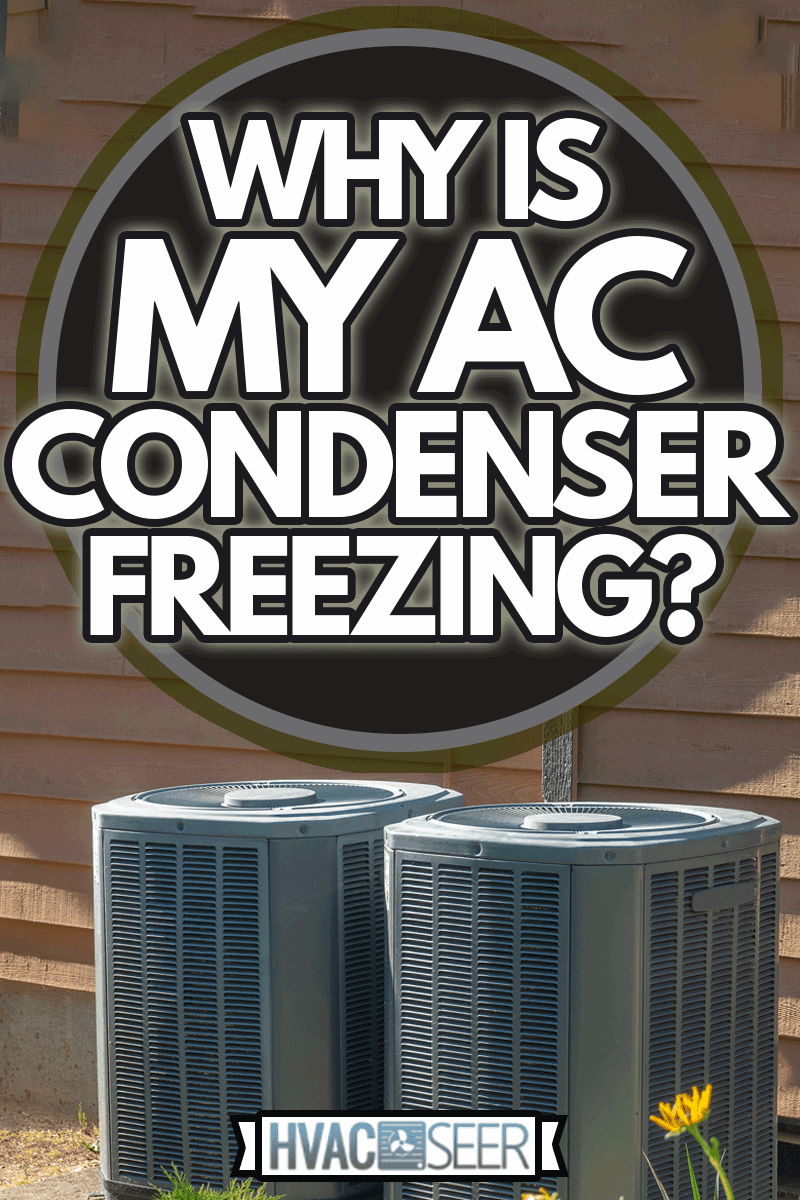
Role of Condenser and Refrigerant in an Air Conditioner
The condenser is a part of the air conditioner that converts high-pressure gas into a liquid. It is a heat exchanger that cools the refrigerant gas and transfers heat to the outside air. The condenser also removes moisture from the refrigerant gas, preventing corrosion of metal parts in an air conditioner.
On the other hand, air conditioners use refrigerants to cool air. Refrigerant is a chemical that absorbs heat from the air and releases it into the surrounding environment.
They are also used in industrial processes such as cooling towers, desalination plants, and power plants. The most common types of refrigerants are hydrocarbons (such as R-22), chlorofluorocarbons (CFCs), hydrofluorocarbons (HFCs), ammonia, sulfur dioxide, and hydrogen sulfide.
Signs Your AC Condenser is Freezing Up: Frozen AC Line and Evaporator Coil
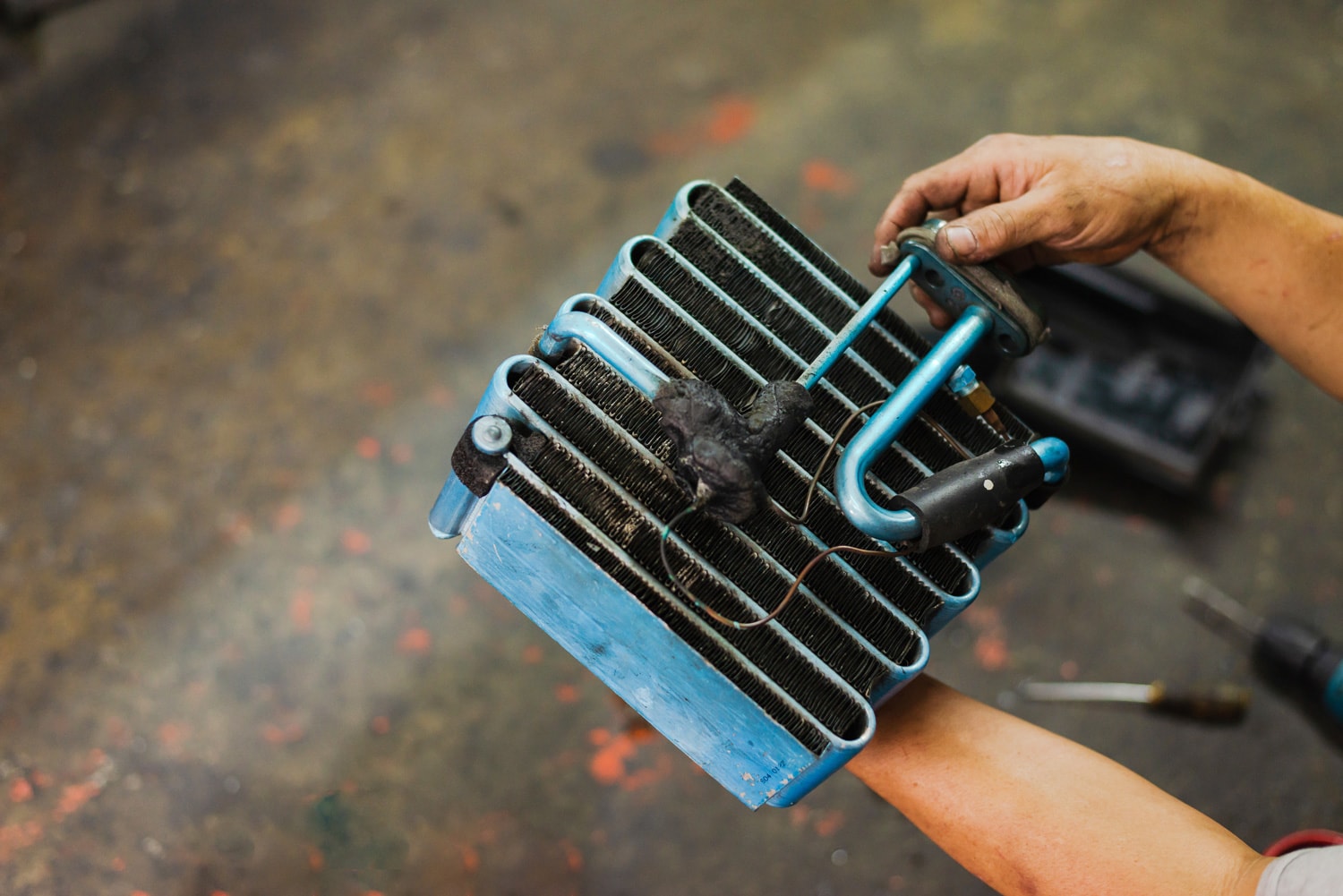
An air conditioning system contains a compressor, condenser, evaporator, and lines. The refrigerant lines are the ones that carry the liquid or gas refrigerant throughout the system. One of the first indicators of a frozen AC condenser is frozen AC lines.
If there is a malfunction with your system, you can step outside to check for ice in the air conditioner lines. Another sign to watch out for is the freezing of the AC's evaporator coil.
You need to unscrew a panel and properly inspect the coil to check for this. Unlike your AC lines, you may have a little more difficulty checking the evaporator coil. It is best to seek professional help to avoid more damage. Other more subtle signs you can watch out for include condensation on your unit and condensate drain.
What Causes AC Condenser to Freeze?
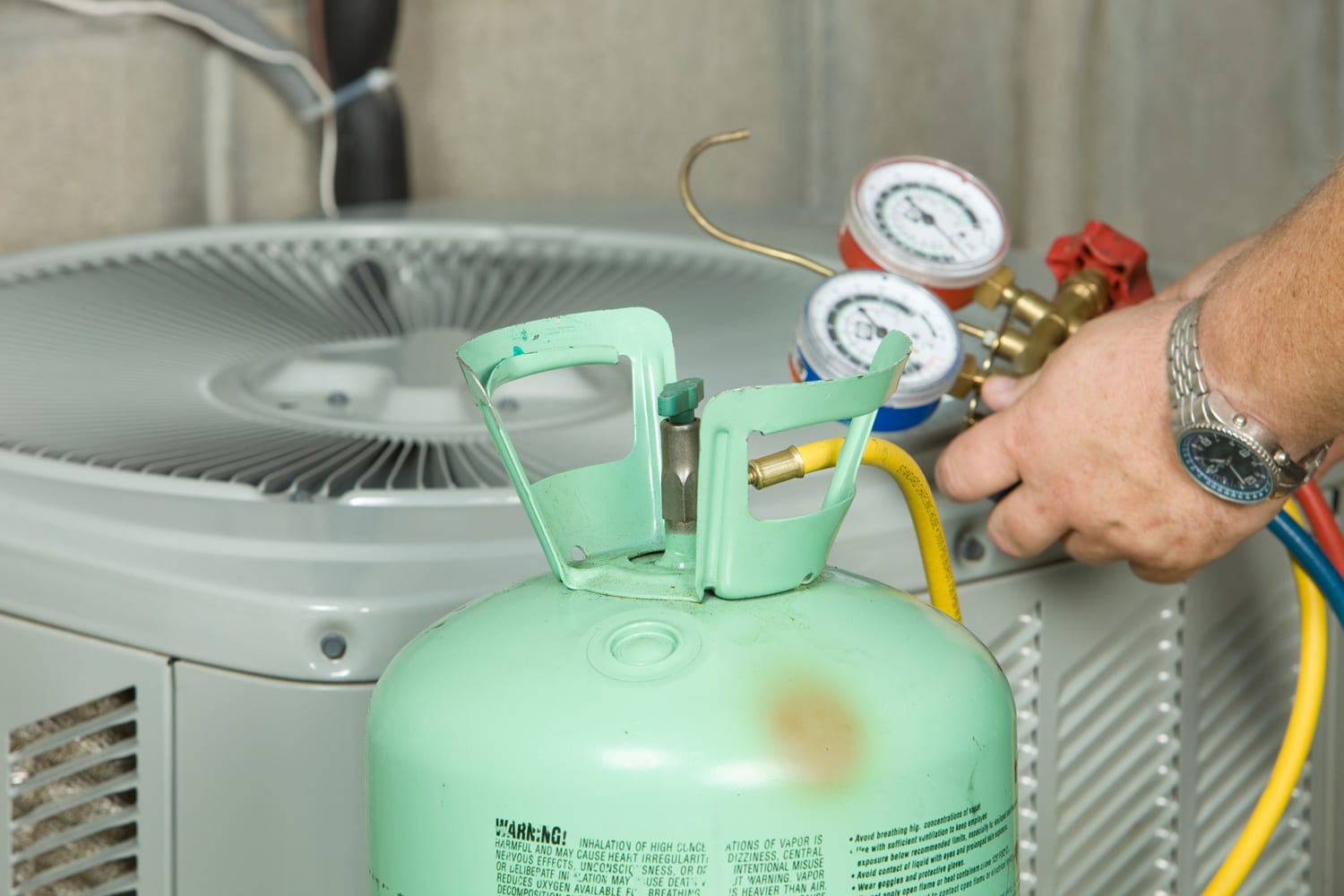
While your AC condenser can freeze for several reasons, here are the most common problems.
Clogged Air Filter
The air filter is a critical component of the air conditioner. It helps filter the incoming air and improve the quality of the indoor environment. If it gets clogged, it can lead to significant problems with your AC system, including a frozen condenser. When air doesn't pass to your evaporator coil, it decreases the refrigerant's temperature and leads to freezing eventually.
Several factors can cause a clogged filter. Some examples include:
- Not changing your filter often enough
- Using an incorrect type of filter
- A dirty or damaged filter
If you notice that your AC is not working correctly, you should check your air filter to see if it is clogged. The best way to get rid of clogs is by using a vacuum cleaner and sucking out all the dust.
Blocked Air Vents
Air conditioning units are designed with an internal air vent mechanism that regulates airflow. Air enters at one end, passes through a filter, and exits at another end. As the air moves into and out of the vents, this regulates airflow throughout your home or office space.
A vent can be located anywhere in your house, but typically it's placed near the floor or ceiling. If sufficient air isn't transferred from the vent to the evaporator coil, it can cause freezing. To ensure enough air is being sucked in, remove cushion seats or cushions blocking the vent.
Dirty Evaporator Coil
The evaporator coil is a part of an air conditioner designed to cool the air inside the room. It needs to be cleaned regularly to maintain its performance and efficiency. If it’s not cleaned correctly, it will get dirty and clogged up with dust particles, resulting in reduced cooling capacity.
Dirty evaporator coils can cause freezing problems in the AC unit. Keep in mind this happens because water cannot effectively evaporate when dirt is present on the coil. The dirt can disrupt the flow between the evaporator coil and warm air, triggering a drop in temperature and subsequently freezing.
Low Level of Refrigerant
Low refrigerant can lead to a lack of cooling and high energy consumption. When there is not enough refrigerant, the compressor cannot work as efficiently, and it might increase the likelihood of overcooking. When refrigerant is at a low level, it can't absorb the regular amount of heat.
When this happens, the temperature would keep decreasing and eventually lead to the freezing of the AC condenser. Low refrigerant can also lead to a shorter life span of an air conditioner.
Damaged Blow Fan
A damaged blower in an air conditioner can lead to freezing. A blower fan directs warm air to the coils of the AC. When it is broken, the coils receive insufficient air allowing them to freeze and eventually make the AC stop working.
The symptoms of a damaged blower include a loud noise, the unit being too hot or cold, and the compressor not turning on.
How Do You Prevent and Fix AC That Freezes?
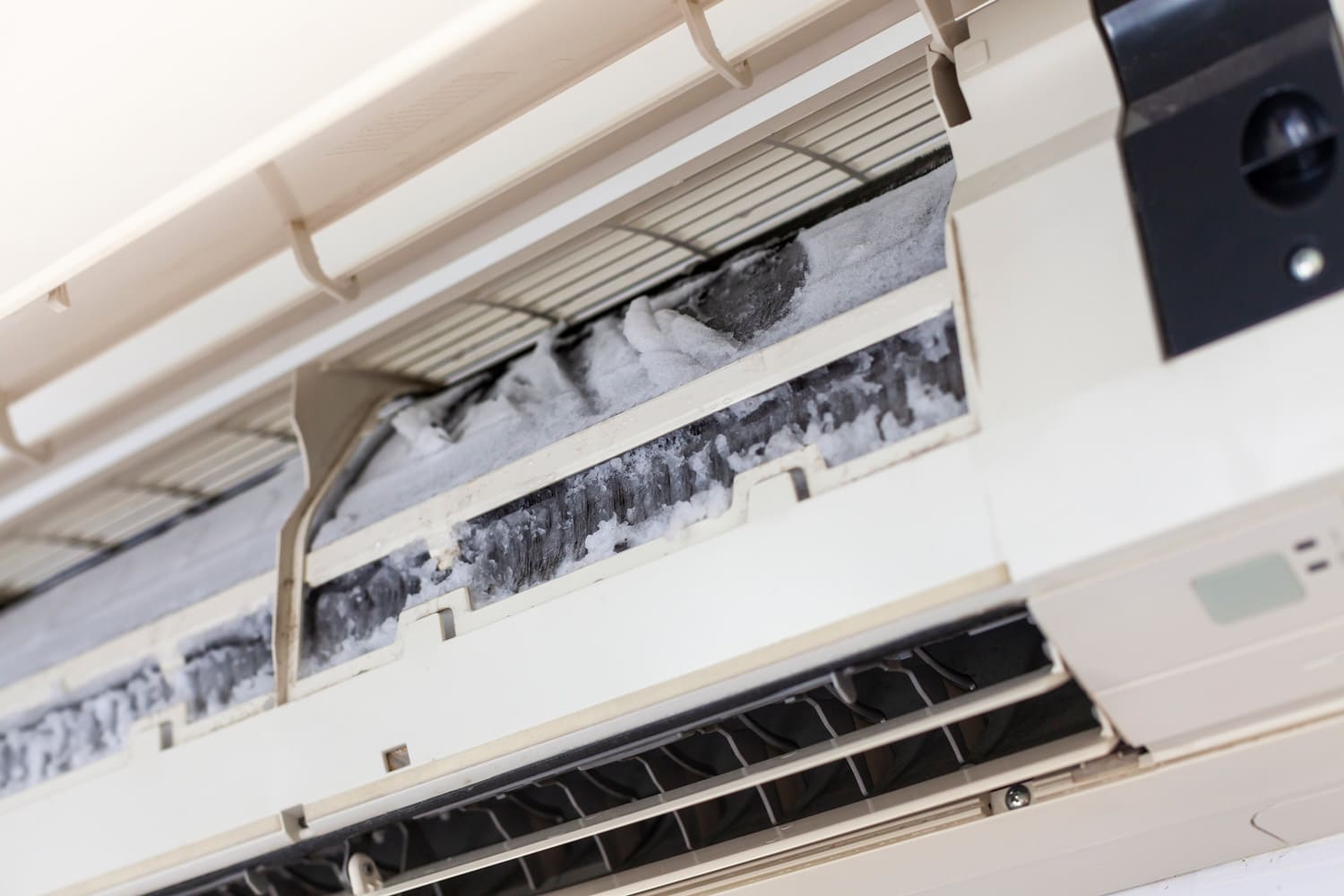
If you notice that your AC is frozen, here are simple ways you can troubleshoot it before calling an HVAC company.
Step 1 - Turn Air Conditioner Off or On
The thermostat is a device that helps you control your home's temperature. You can use it to turn your AC on and off easily.
Do this by turning the thermostat to the "Off" position. Another way is to press and hold the power button on your air conditioner for 3 seconds or longer. After this, you can release it, and it will turn off. Leave it for a few minutes till cooling stops. Turn the fan on again. This generates hot air that can cause defrosting.
Step 2 - Clean or Replace Your Dirty Air Filter
Air filters are a significant part of the air conditioning system. They work to filter the air and remove particles, chemicals, and other contaminants that can affect air quality in the room.
A dirty filter is not just an inconvenience for you. It can lead to an AC freezing. If your AC freezes, one way to solve the problem is by cleaning the air filter or replacing it altogether. If dirt from the filter reaches the coil, it might lead to freezing.
Step 3 - Remove Blockage In The Vent
The panels of the air conditioner vent can be with hair, toy parts, or other debris, preventing the unit from cooling properly. It is essential to remove this blockage as soon as possible because it can cause severe damage to your unit and potentially lead to expensive repairs.
To do this, you'll need a few tools, including a vacuum cleaner attachment, some pipe cleaners or a wire brush, and a pair of pliers. The best way to remove the blockage from an AC vent is by using a vacuum cleaner with a narrow nozzle attachment that you can use on the inside of the vent. Also, thoroughly inspect your home for closed air vents.
How Long Does It Take For AC to Unfreeze?
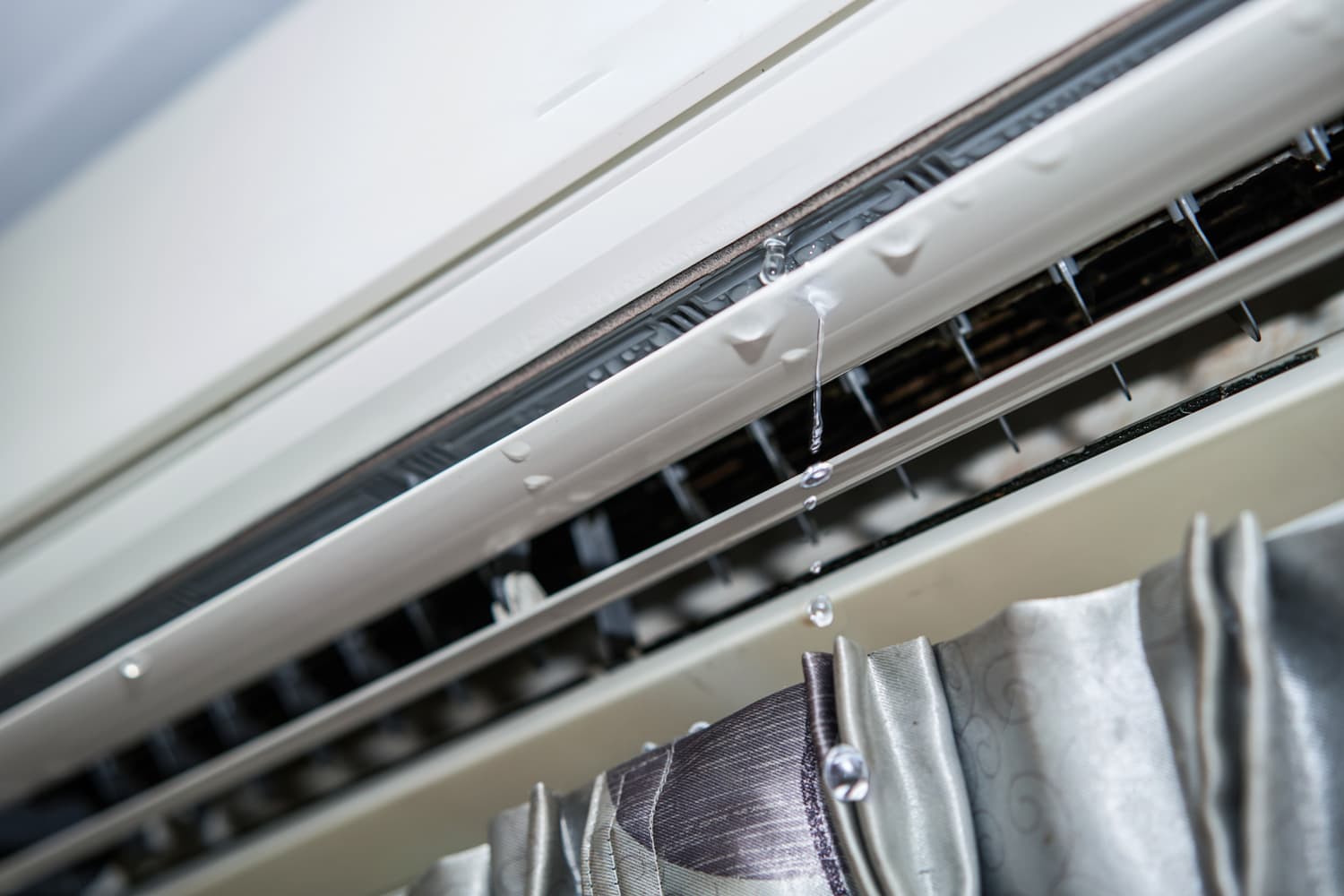
The thawing process can take up to 24 hours, depending on the size of the AC unit. When the system is defrosting, it begins with a fan that blows hot air into the coil and then enables it to defreeze faster.
Different factors determine how fast an air conditioner unfreezes. For example, a medium-sized unit may take around 12 hours, while a large one can take the whole day.
Another factor is the level of ice build-up. The greater the ice unit in an air conditioner, the longer it would take to defrost. It is because more heat is required to melt the ice. A smaller ice build-up would disintegrate in a few hours.
The Wrap Up
A properly functioning air conditioner removes heat from inside a building by circulating air through its coils. One of the most critical parts of an air conditioning system is the air conditioner's condensers.
They convert high-pressure gas into a liquid that is then cooled to lower the temperature and humidity in the room. It is essential to routinely check up on your AC unit to detect and deal with freezing early. If you wish to learn more ways to ensure your AC unit works properly, check out these related articles.
How Far Can AC Unit Be From House ?
